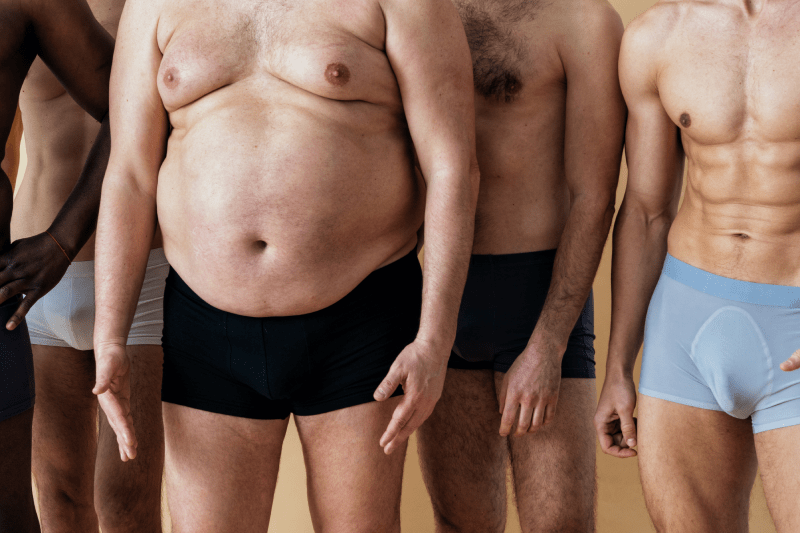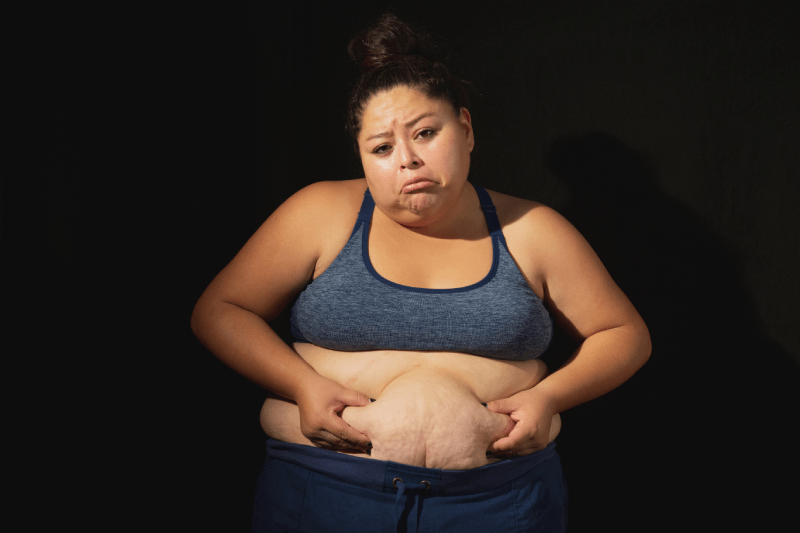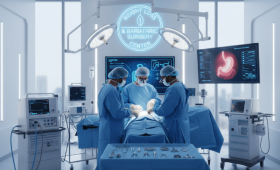What is Gastric Sleeve Surgery?
Gastric sleeve surgery, known as Sleeve Gastrectomy, is one of the most frequently performed and highly effective surgical methods used in the treatment of obesity. In this procedure, approximately 75% to 80% of the stomach is surgically removed, and the remaining stomach is shaped into a narrow tube resembling a banana. The reduction in stomach size enables the patient to achieve satiety with much less food intake.
Concurrently, removing the large portion of the stomach that secretes the hunger hormone (Ghrelin) leads to a significant decrease in appetite. This dual mechanism allows the patient to begin fast and sustained weight loss. It is crucial to remember, however, that the operation is merely a tool; true success hinges on the patient’s permanent changes in lifestyle and dietary habits after the surgery, making the planning and follow-up of the treatment process absolutely critical.
Who is Suitable for Gastric Sleeve Surgery?
Gastric sleeve surgery is generally suitable for individuals classified as morbidly obese, meaning those with a Body Mass Index (BMI) of 40 and above. Additionally, patients with a BMI between 35 and 40 who have serious co-morbid health conditions related to obesity, such as type 2 diabetes, high blood pressure, sleep apnea, or high cholesterol, can also be candidates for the surgery. The decision regarding a patient’s suitability involves a detailed evaluation of surgical risks, the patient’s history of weight loss attempts, their psychological state, and their motivation to adhere to post-surgery lifestyle changes. This comprehensive assessment process is a fundamental prerequisite, adhering to strict ethical and medical standards in both the Netherlands and Turkey.

What is the Success Rate and Expected Weight Loss of the Surgery?
Gastric sleeve surgery stands out as one of the bariatric surgical methods with the highest success rates globally. The vast majority of patients achieve a permanent loss of 60% to 80% of their excess weight within the first 12 to 18 months following the operation. Success is not solely measured by weight loss; the high rates of improvement or complete resolution of obesity-related conditions, such as diabetes and hypertension, are also key success criteria. However, these positive outcomes are directly correlated with the patient’s adherence to the post-surgery diet and exercise regimen. The choice of clinic and the surgeon’s experience are vital factors that influence not only the technical success but also the long-term follow-up achievement.
How Long Does the Post-Surgery Recovery Process Take?
Since gastric sleeve surgery is typically performed using the laparoscopic (keyhole) method, the recovery process is generally fast and comfortable. Patients usually stay in the hospital for 3 to 4 nights after the surgery, during which nutrition begins with a clear liquid diet. Fatigue is normal during the first week after discharge, and a return to work usually takes place within 10 to 14 days. However, full physical recovery and reaching normal energy levels might take several weeks. The most important factor during this period is strict adherence to the liquid, pureed, and solid food progression phases prescribed by the surgical team and dietitian. For international patients, the accommodation and transfer services offered in Turkey significantly contribute to a stress-free experience during this sensitive recovery phase.
Is Gastric Sleeve Surgery a Permanent Solution?
Gastric sleeve surgery creates a physically permanent change because a large portion of the stomach is permanently removed. The primary effect of the surgery—the restriction mechanism and appetite suppression—is lasting. However, a small percentage of patients may regain weight years later by reverting to poor eating habits or consuming high-calorie liquid foods. Therefore, surgical success alone is insufficient; long-term permanence requires the patient’s disciplined follow-up, psychological support, and adoption of a new lifestyle. For patients who view the surgery as a tool and commit to lifelong lifestyle change, the gastric sleeve offers a definite and lasting solution against obesity.
What are the Risks of the Operation?
As with any major surgical procedure, gastric sleeve surgery carries potential risks. The most significant surgical risks include leaks (seepage along the staple line), bleeding, and infection. The risk of leakage is directly related to the quality of the surgical technique and the hospital infrastructure, making the selection of an experienced surgeon critically important. Long-term risks may include nutritional deficiencies (vitamin and mineral), reflux, or, rarely, gastric obstruction. To minimize these risks, detailed pre-operative evaluation, the use of state-of-the-art equipment during surgery, and the consistent use of post-operative vitamin supplements are mandatory. JCI-accredited hospitals in Turkey offer high standards in managing these risks.
Main Factors Affecting Bariatric Surgery Cost
The cost of bariatric surgery depends on many complex factors. Foremost among these is the experience and expertise level of the surgical team. Second, the quality of the hospital where the surgery is performed (private vs. public, accreditation status), the quality of the consumables used (such as stapling cartridges), the length of hospital stay, and the package content of comprehensive pre- and post-operative follow-up services are all determinants. In Western European cities like Rotterdam, high labor costs, insurance, and operating expenses dramatically inflate prices; in Turkey, the exchange rate advantage and focus on medical tourism reduce the cost without compromising quality.
Why is Lifestyle Change Critically Important?
The long-term success of gastric sleeve surgery is dependent on lifestyle changes by up to 80%. The surgery only restricts portion sizes; it does not alter the patient’s urge to eat, emotional eating habits, or unhealthy food preferences. Therefore, regular exercise, adopting a protein-focused diet under the supervision of a dietitian, and receiving psychological support after the surgery are critically important. Without this commitment, even with a reduced stomach, the patient faces a high risk of turning to high-calorie liquid foods or unhealthy snacks. Comprehensive packages like those offered by Cure Holiday provide the long-term support mechanisms necessary for this vital lifestyle change.
What is the Post-Surgery Nutrition and Diet Process Like?
The post-surgery nutrition process is a gradual and disciplined journey that allows the stomach to heal and adapt to its new capacity. The process typically progresses through a clear liquid diet for the first 1-2 weeks, followed by pureed foods for 2-4 weeks, and finally transitioning to solid foods around 4-6 weeks post-operation. Each of these stages must be closely monitored by a dietitian to avoid straining the stomach, ensure adequate hydration, and maximize protein intake. In the Netherlands, these follow-up sessions can be separate and costly, whereas Cure Holiday packages typically cover the necessary nutritional counseling for the first 6-12 months.
Is Gastric Sleeve Safe Under Medical Tourism?
Having gastric sleeve surgery under medical tourism is extremely safe, provided an accredited and correct institution is chosen. Turkey, with its high volume of experienced bariatric surgeons and JCI-approved hospitals, offers services that meet international standards. Safety is ensured by the modern infrastructure of the clinics, the surgeon’s case volume, and the quality of the technological equipment used. Cure Holiday does not direct its patients to random clinics but exclusively to institutions that meet these international standards, have a reliable track record of successful outcomes, and ensure a safe process. Low cost does not signify low quality; rather, it is a result of the exchange rate advantage.
General Overview of Gastric Sleeve Surgery Costs in the Netherlands
The Netherlands is known for its high standard of living and advanced social security system, but specialized procedures like aesthetic and bariatric surgery are typically very high in cost. The total expense of gastric sleeve surgery in Rotterdam or other major Dutch cities, if not covered by insurance, can be as much as 4 to 6 times the price of equivalent all-inclusive packages in Turkey. These high prices are attributed to the direct passing on of high taxes, surgeons’ professional insurance premiums, high-salaried healthcare staff, and elevated hospital operating expenses to the patients. Consequently, many Dutch and European citizens are seeking alternatives to receive the same quality of service at a more affordable price.
Gastric Sleeve Coverage under Dutch Health Insurance
Basic health insurance (Basisverzekering) in the Netherlands may cover bariatric surgery (including the gastric sleeve), but this coverage is subject to specific and stringent conditions. The patient is required to prove the medical necessity of the surgery, and this process is generally long, bureaucratic, and psychologically demanding. Typically, for insurance acceptance, the BMI must be very high, and the patient is expected to have participated in supervised diet programs for at least one year, proving that they were unable to lose weight. Meeting these requirements can take years, leading to a significant time loss for patients facing rapidly progressing obesity issues.
The Long Requirements and Processes to Qualify for Insurance Coverage
The process required for gastric sleeve surgery to be covered by insurance in the Netherlands involves a series of challenging steps. The patient must undergo an evaluation lasting several months by a multidisciplinary team (dietitian, psychologist, bariatric surgeon). Acceptance of the application requires evidence of long-term lifestyle commitment, a documented history of failed diets, and compliance with specific psychological criteria. This bureaucratic marathon subjects patients to months, sometimes more than a year, of waiting and documentation, during which time the patient’s health risks associated with obesity continue to increase.

Long Waiting Times for Gastric Sleeve Surgery in the Netherlands
Waiting lists for surgical procedures covered by insurance in the Netherlands are quite extensive. Obtaining an appointment for elective (non-emergency) procedures like gastric sleeve surgery, especially within the national health system, can take several months. In some cases, the waiting period can extend from 6 months to over 1 year. Although private clinics offer shorter waiting times, the costs escalate significantly. These long waiting periods can lead to the worsening of co-morbidities like diabetes, heart disease, or joint problems caused by obesity. In contrast, the appointment process with Cure Holiday in Turkey can typically be completed within a few weeks.
Negative Health Effects of Waiting Periods
The long waiting periods in the Netherlands create serious negative impacts on both the physical and psychological health of the patient. Obesity is a progressive disease where you cannot afford to lose time. During the waiting process, the patient’s BMI may increase further, and existing conditions like diabetes or hypertension may become uncontrollable. Psychologically, constant waiting leads to hopelessness and loss of motivation. For these reasons, seeking a solution like Cure Holiday, where you can have surgery quickly and safely, is a rational medical decision rather than postponing the operation.
Private Clinic Pricing in Rotterdam: Hidden Costs
Pricing at private bariatric clinics in Rotterdam typically includes the basic surgical fee, but comprehensive “all-inclusive” packages like those in Turkey are rare. Hidden costs often forgotten by patients or not included initially include the anesthesia fee, hospital bed charges, all necessary pre-operative blood and imaging tests, post-operative pain management, and mandatory post-discharge sessions with a dietitian/psychologist. These additional expenses rapidly elevate the total cost, which initially seemed reasonable, to a very high level by Dutch standards.
Costs of Dietitian and Psychological Support in the Netherlands
The long-term and critically important dietitian and psychological support sessions required after gastric sleeve surgery in the Netherlands are usually billed at high hourly rates. Regular consultations are mandatory for the success of the surgery during the first year, and the total cost of these sessions can amount to thousands of Euros. Even if insurance covers a portion of these sessions, the out-of-pocket expense for the patient remains a significant burden. In Cure Holiday packages, a large part of these critical follow-up and counseling services is included in the affordable package price, reducing the financial burden on the patient and encouraging long-term success.
Reflection of High Labor and Clinic Expenses on Prices
The salaries of bariatric surgeons, anesthesiologists, and highly qualified nurses in Rotterdam are among the highest in European standards. Furthermore, private hospital rents, energy costs, and general operating expenses in the Netherlands are much higher compared to Turkey. All these factors are reflected in the final bill charged to the patient. In Turkey, due to the general economic structure and the value of the local currency against foreign exchange, the services of surgeons with the same level of expertise can be offered at much more accessible prices, creating a huge price advantage compared to the Netherlands.
Pre-Surgery Evaluation Process in Rotterdam
The pre-surgery evaluation process at bariatric centers in Rotterdam is meticulously carried out but is often time-consuming and requires multiple appointments. This process includes endoscopy, ultrasound, cardiological, and pulmonary assessments. In the Netherlands, each of these tests, even if covered by insurance (with co-payments), can require appointment chains spanning months. With Cure Holiday in Turkey, all these comprehensive and vital tests are completed quickly and coordinately, usually on the day of hospital admission, immediately before the surgery.
Medical Quality and Surgeon Expertise in the Netherlands
The high medical quality in the Netherlands is an undeniable fact. Surgeons are well-trained and competent. However, the annual case volume of bariatric surgeons in the Netherlands is far below that of centers specialized in obesity surgery in Turkey. Due to the high volume of medical tourism, Turkish surgeons have gained a unique variety of international cases and experience, elevating their dexterity and ability to intervene in complex situations to a high level.
Surgical Techniques and Modernity Used in the Netherlands
Clinics in the Netherlands use modern surgical techniques, but there is no major difference in the modernity of equipment and techniques. JCI-accredited hospitals in Turkey can provide services using the latest technology stapling devices and advanced imaging systems for laparoscopic surgery, which are on par with or newer than those used in Dutch clinics. The fundamental difference is that the cost of this technology is offered at a much more affordable price in Turkey due to lower operating expenses.
Cost of Post-Surgery Follow-up Visits
Mandatory post-surgery follow-up visits and control appointments in the Netherlands should take place regularly, especially within the first year. These visits include doctor and dietitian appointments and can strain the patient’s budget if they are outside of insurance coverage or involve significant co-payments. Patients receiving treatment with Cure Holiday in Turkey, on the other hand, usually have access to free remote follow-up (via online consultations) during this critical first year.
Accommodation and Recovery Expenses in the Netherlands
Accommodation costs for the pre- and post-surgery stay in Rotterdam or other Dutch cities are quite high. The costs of accommodation, food, and local transportation for the patient and companion for a few days significantly burden the total price. Cure Holiday packages, conversely, cover all out-of-hospital accommodation in luxurious 4 or 5-star hotels and all airport/hospital transfers with VIP vehicles, effectively eliminating these expenses.
Lack of Low Exchange Rate Advantage
The use of the Euro in the Netherlands does not create any exchange rate advantage for international patients arriving with currencies such as the Canadian Dollar or the US Dollar. Prices are fixed based on the high Euro exchange rate. In Turkey, the opposite is true; patients coming from abroad have the opportunity to purchase the same quality service at a much lower cost by utilizing the Turkish Lira’s advantage against foreign currencies.
Why Do Patients Have to Pay High Costs in Rotterdam?
The primary reason for paying high costs in Rotterdam is not low surgical quality, but the structural costs imposed by high European living standards. These costs include high rental prices, high taxes, expensive insurance premiums, and high fees demanded by surgeons. The patient is essentially burdened with the general economic load of the Netherlands in addition to the cost of the surgical procedure. Cure Holiday eliminates these structural costs, allowing you to pay only the true value of the medical service.

Turkey: A Global Center for Gastric Sleeve Surgery
Turkey has become a global center not only for hair transplantation but also for bariatric surgery in recent years. Turkish surgeons handle a higher volume of cases than their counterparts in Europe and America and continuously implement the newest surgical techniques. Government support for medical tourism, the modernization of hospitals, and the focus on international accreditations have made Turkey a global attraction in terms of both cost and quality. Cities like Istanbul and Izmir are particularly pioneering centers for bariatric surgery for international patients.
The Secret Behind the Shockingly Low Gastric Sleeve Costs in Turkey
The secret behind the shockingly low gastric sleeve costs in Turkey compared to the Netherlands lies not in low quality, but in economic factors. The value of the local currency makes the operation cost much more accessible in terms of international currencies. Furthermore, clinics and hospitals can offer competitive prices by reducing unit costs due to high case volumes. This economic balance allows for comprehensive services, often equivalent to or better than those offered by Dutch clinics, to be obtained at a much more affordable price.
Cure Holiday: The Address for Reliability and Economic Solutions
Cure Holiday is committed to offering its patients the most reliable and economic solution in obesity surgery without compromising on high quality. The company collaborates only with highly specialized surgeons with large case volumes and hospitals that implement JCI standards. By managing the patient’s entire process (appointment, transfer, accommodation, interpretation) from start to finish, it offers a flawless, reliable, and affordable alternative to the difficult bureaucratic procedures and high costs in the Netherlands.
Details of Cure Holiday’s All-Inclusive Packages
Gastric sleeve surgery with Cure Holiday is typically offered in comprehensive “all-inclusive” packages. These packages cover the surgery itself, surgeon and anesthesia fees, disposable materials used (cartridges), hospital stay (usually 3-4 nights), all pre-operative blood and imaging tests, luxury hotel accommodation (including a companion), VIP transfers between the airport and hospital, all medications, vitamin supplements, and professional interpreter services. This transparent pricing completely eliminates the hidden costs that often arise later, unlike in the Netherlands.
Transparency of Package Pricing Against Hidden Costs in Rotterdam
Cure Holiday’s comprehensive and single package pricing offers complete transparency against the fragmented pricing model based on per-graft or basic surgical fees in Rotterdam. Patients clearly know the total cost they will pay before arriving in Turkey. In the Netherlands, every service billed separately by the hospital and doctors (anesthesia, tests, post-op dietitian) is consolidated under a single cost in the Cure Holiday package, simplifying the patient’s budget management.
High Case Volume and Experience of Surgeons in Turkey
Turkey’s global success in bariatric surgery is based on the incredibly high case volume of its surgeons. Thanks to medical tourism, Turkish surgeons have gained experience on a much larger number and variety of obesity cases compared to their counterparts in the Netherlands. This intensive practice enables them to continuously perfect their surgical techniques and minimize the risk of complications. Cure Holiday connects its patients with these experienced surgeons who have a proven track record of success, even in the most challenging cases.
JCI Accredited Modern Hospitals in Istanbul
The hospitals Cure Holiday collaborates with hold JCI (Joint Commission International) accreditation, representing international health standards. This accreditation signifies that the hospitals meet the highest global standards not only in luxurious appearance but also in patient safety, sterilization, equipment quality, and staff competence. All surgical materials and technologies used in these hospitals are of the exact same quality as those used in the best clinics in the Netherlands.

Comprehensive Pre-Surgery Tests and Risk Analysis
The Cure Holiday process includes all the comprehensive tests that might take weeks in Rotterdam to fully determine the patient’s suitability for surgery. These tests (endoscopy, cardiological evaluation, respiratory function tests, detailed blood panel) are performed quickly and coordinately upon hospital admission. This meticulous risk analysis maximizes the safety of the operation while preventing the patient from waiting months for test results, as is common in the Netherlands.
Comfortable and Luxury Accommodation with Cure Holiday
Comfort and hygiene are critically important during the post-operative recovery period. Cure Holiday packages include accommodation for the patient to rest for 1-2 days after discharge from the hospital in luxurious 4 or 5-star hotels. This accommodation not only ensures the physical comfort of the patient but also allows the companion to have a stress-free waiting and support process. The inclusion of accommodation and all VIP transfer services in the price eliminates the high accommodation costs typical of Rotterdam.
Fast Appointment Opportunities for Patients from the Netherlands
The long insurance and surgical waiting lists in Rotterdam are time-consuming for patients struggling with obesity. Thanks to Cure Holiday’s high-capacity contracted hospitals, the conditions of patients from the Netherlands are evaluated quickly, and appointments can usually be arranged within a few weeks. This speed is important for psychological motivation and plays a vital role in preventing the progression of obesity-related health problems.
Professional Translator Support Eliminating the Language Barrier
Accurate understanding of medical terms is vital during international travel. Cure Holiday provides professional interpreters who are fluent in medical terminology to accompany the patient throughout the entire process (hospital admission, consultations with the surgeon, discharge instructions). This support ensures that patients coming from a Dutch-speaking country feel safe and that communication with the surgical team is complete and accurate.
Post-Gastric Sleeve Dietitian and Psychological Follow-up Services
Dietitian and psychological follow-up are mandatory for long-term success after gastric sleeve surgery. Cure Holiday packages typically include remote follow-up sessions with dietitians and psychologists via Skype/Zoom for the first 6 months to 1 year. This ensures the patient receives the expert support they need after leaving Turkey without incurring high costs, eliminating the thousands of Euros in follow-up expenses encountered in the Netherlands.
Turning the Surgery into a Holiday Experience in Turkey
Cure Holiday positions gastric sleeve surgery not just as a medical procedure but as a personal renewal journey. After being discharged from the hospital and receiving doctor approval, patients have the opportunity to explore the historical richness of Istanbul (Hagia Sophia, Topkapı Palace) or the tranquility of the Aegean/Mediterranean coasts during their remaining days. Having surgery and experiencing a cultural holiday for a fraction of the Rotterdam price is a major advantage over Dutch options.
Directing Cost Savings Towards Health Expenditures
The significant savings you achieve by avoiding the high costs in Rotterdam can be directed towards higher quality nutrition, working with a personal trainer, or receiving longer-term psychological counseling services in your post-surgery life. The savings made with Cure Holiday not only reduce the cost of the surgery once but also provide the freedom to invest more in your long-term health goals.
Ease of Travel and Travel Costs to Turkey
Istanbul is one of the largest airline hubs globally, with numerous direct flight connections to the Netherlands. Travel to Turkey is both shorter and generally more affordable compared to Canada or the US. Since Cure Holiday packages cover all expenses except travel, the patient only needs to purchase an economical flight ticket, further reducing the total cost.
1 Year of Remote Follow-up and Support with Cure Holiday
The first year after the surgery is the most critical period for weight loss and adaptation. Cure Holiday offers its patients 12 months of remote support and follow-up through expert dietitians and coordinators via a private communication channel. This continuous access ensures patients receive immediate professional help for any issues, doubts, or dietary difficulties they encounter, which is key to long-term success.
Safe Medical Tourism and Insurance Guarantee
All operations under medical tourism in Turkey are supervised by the Ministry of Health and are protected by international patient rights guarantees. Choosing a corporate firm like Cure Holiday means not only cost advantage but also an additional corporate guarantee and insurance protection against all possible post-operative scenarios. This is a highly valuable reassurance for patients avoiding the insurance labyrinth in the Netherlands.
Achieve Quality in Turkey with the Money You’d Spend in Rotterdam
Instead of paying high amounts for gastric sleeve surgery in Rotterdam, you can use a much smaller portion of that money through Cure Holiday to have your surgery performed in Turkey by a specialist surgeon at an internationally accredited, JCI-approved hospital. You can then spend the remaining budget on a comfortable travel and recovery process, turning this critical decision from financial stress into a rewarding new beginning.

Get a Free Consultation and Price Quote with Cure Holiday
Instead of wasting time with insurance conditions and waiting lists in the Netherlands, arrange a free consultation with Cure Holiday’s online advisors immediately. The expert team will evaluate your specific situation and provide an “all-inclusive” price quote that is incredibly suitable and transparent compared to Rotterdam costs. This consultation is the first quick and concrete step toward starting a new and healthy life.
Conclusion: The Rightest Address for a New Beginning: Cure Holiday Turkey
Gastric sleeve surgery is not just an aesthetic procedure but a serious medical decision that saves lives and radically changes the quality of life. Instead of facing long waiting times, difficult insurance conditions, and astronomical costs in Rotterdam, Netherlands, with Cure Holiday in Turkey, you find both the cost advantage and world-class surgical expertise in a single transparent package. For starting a new and healthy life with a safe, fast, and comfortable medical journey, the most rational and economical choice is undoubtedly Cure Holiday Turkey.



